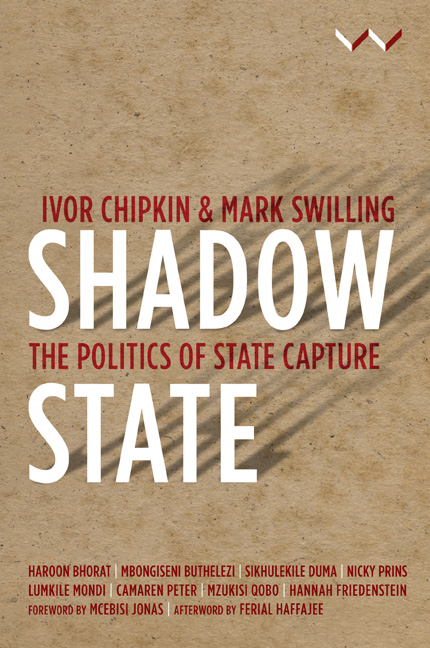Book contents
- Frontmatter
- Contents
- List of figures and tables
- Acronyms and abbreviations
- Key terms
- Acknowledgements
- Foreword
- Prologue
- Introduction
- Chapter 1 Structuring the Capture of the State
- Chapter 2 The Politics of Betrayal
- Chapter 3 Power, Authority and Audacity: How the Shadow State Was Built
- Chapter 4 Repurposing Governance
- Chapter 5 Conclusion
- Afterword
- Contributors
- Index
Introduction
Published online by Cambridge University Press: 17 May 2019
- Frontmatter
- Contents
- List of figures and tables
- Acronyms and abbreviations
- Key terms
- Acknowledgements
- Foreword
- Prologue
- Introduction
- Chapter 1 Structuring the Capture of the State
- Chapter 2 The Politics of Betrayal
- Chapter 3 Power, Authority and Audacity: How the Shadow State Was Built
- Chapter 4 Repurposing Governance
- Chapter 5 Conclusion
- Afterword
- Contributors
- Index
Summary
The new struggle for democracy: how civil society fought back against state capture
In the classical texts, tyranny, as opposed to despotism, refers to a form of government that breaks its own rules. This is a useful starting point for discussing political developments in South Africa in the past ten years and the civil society response to it. The ANC government under Jacob Zuma became more and more tyrannical as it set itself up against the Constitution and the rule of law in an effort to capture the state.
In moves reminiscent of events in the 1980s, independent journalists, social movements, trade unions, legal aid centres, NGOs, the churches and some academics have helped mobilise South African society against state capture. A new and varied movement has arisen, bringing together awkward partnerships between ideologically disparate groups and people. What they have nonetheless shared is a broad support for the Constitution, for democracy and for a modern, professional administration, and they are all, broadly speaking, social democratic in orientation.
The publication of the Betrayal of the Promise report, on which this book is based, constituted a key moment, helping to provide this movement with a narrative and concepts for expressing a systemic perspective on state capture that helped its readers to, in the words of former Minister of Finance Pravin Gordhan, ‘join the dots’.
The particular instance of so-called ‘state capture’ that we discuss in this book is part of a familiar and recurring pattern in the history of state formation in South Africa. It is, in fact, impossible to understand the evolution of South African politics and statecraft without understanding the deeper dynamics of what we refer to today as state capture. There is a clear and direct line of sight from the origins of the state in the Cape Colony, when it was ‘captured’ by the Dutch East India Company, through to the era of Cecil Rhodes and ‘Milner's Kindergarten’ – the name popularly given to the young British civil servants who served under High Commissioner Alfred, Lord Milner – in post-Boer War South Africa.
The world that the first generations of mining magnates, the so-called Randlords, built on the Witwatersrand provided the foundation for the election victory of the National Party in 1948.
- Type
- Chapter
- Information
- Shadow StateThe Politics of State Capture, pp. 1 - 18Publisher: Wits University PressPrint publication year: 2018



